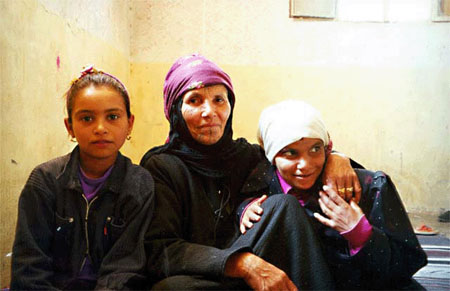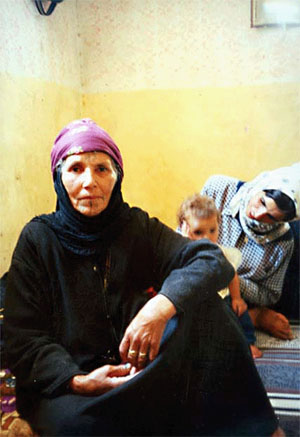
|
 |
|
Umm Muhammed al-Rashaydeh with two of her daughters. Al Rashaydeh village (Al-Khalil - Hebron district) June 2000 |
| Umm Muhammad al-Rashaydeh, east of Hebron, June 30 (1st recording):
|
|
A friend called Anna who works with an Italian NGO that mainly helps bedouin, offers to take me on a drive along the arid eastern valley between Ramallah and Hebron, where several bedouin settlements are still to be found, surviving with great difficulty. We drive beyond Bethlehem through bare, rolling hills where Israeli settlements keep guard -- always on hilltops -- and Palestinian hamlets punctuate the road. These are built in breezeblock not stone and don't have the solid, settled look of villages around Ramallah. Anna says there are different views about whether the people living here are bedouin or not. Originally nomadic, bedouin in Palestine have been gradually sedentarizing over the last hundred years. At one hamlet we stop and ask a man if the people here are bedouin? He says, No, they are Ta'amre. Yet when Granqvist did her ethnographic work in Artas, in the 1920s to 1930s, the Ta'amre were considered bedouin. It seems as if two or three generations after settlement, the sense of bedouin difference is lost or discarded.
Somewhere along the road we pass a totally destroyed village. Anna tells me its name is Kissan, and that there are different versions of how it was destroyed. Much further south, we come upon a fairly large settlement of shacks and concrete houses, surrounded by sheep and goats, a few large trucks and a bulldozer. Anna says that these are Rashaydeh bedouin. An earlier settlement they inhabited was razed by the IDF after a fierce gun battle lasting several days. Then they were transferred here. A crowd of ragged children gather round the car, most of them bare-footed on a ground of flint-like stones. There's nothing green in sight. Anna asks for the mukhtar by name, and we are taken to a house where a large group of mainly older men is sitting. Anna explains who I am, and what I am doing. I ask if I can record with a woman. There's some argument with a man seated on a chair -- the only one -- who says he's from Ramleh, and that I should record with him because he has 'facts' and 'information'. I insist that I want to record with a woman. They indicate a woman seated on the floor near me, old enough to have tattoo marks on her face, but I guess not old enough to remember anything before 1948. The man on the chair begins to instruct her what to say to me. Happily, Umm Muhammad -- this is her name -- is self-confident. She asserts that she also knows what to say. The men then all quit the room, leaving Anna and me with Umm Muhammad and a crowd of younger women. A few minutes later an older woman bursts into the room. It's Umm Muhammad's mother-in-law. She must have heard that there are foreign visitors. I fear a noisy recording session with many overlaid voices. But Umm Muhammad knows how to hold her own against her mother-in-law as well as against the men. Unlike the women at 'Jahileen camp' she hardly speaks about the distant past. It's clear that the 'life story' is for her an opportunity to speak about the present hard situation of her group. Later I discover her age (65), the fact that she was married at age 10, and that she has been in Israeli prison.
Umm Muhammad speaks: |
some lived a life of poverty and humiliation. And some had a life. They moved us from our land in the West and put us here. No electricity, no water. We have water but no pipes. No water, no electricity. In the past we lived in moveable homes (beit rahal), but those houses were better than what we have now. In the past we used to move every fifteen days. We had sheep, we had flocks, and we had our freedom. Now we are squeezed into a small space. We can't go far in our land. If the camel leaves, they shoot him... We call on the great powers to help the 'Arab al-Rashaydeh..."
It's said that if any two Lebanese sit together for half an hour, they will discover a relationship to each other by blood or by marriage. Palestinians are similar, except that the links they establish are more likely to include a friend, or party comrade, or period in prison. Having met Umm Muhammad in this desolate spot in the semi-desert west of the Dead Sea, I later discover that she was in prison with a Palestinian woman in Lebanon whose experiences during the Israeli occupation of South Lebanon (after 1982) I had recorded. Another strange experience: in June 2000 I returned to the West Bank on a different mission, to find and record Palestinian oral historians. During this trip, meeting old friends from Beit Laham, I reminded them that they had once promised to take me to record with a bedouin woman they knew well. We drove southeast from Beit Laham, through scrubby agricultural land. After a while we reached a settlement recognizable as bedouin through the number of trucks and the big black containers in which water is stored. We entered a home, shook hands with everyone including the woman who was to speak, who sat next to me on the floor. It was only as she was half-way into her first sentence that we simultaneously recognized each other. It was Umm Muhammad al-Rashaydeh. Her second recording is included here. Differences in spoken recollection introduced by time and context are problems that people who work with oral history have to take into account. Because on my second visit I was accompanied by someone whom Umm Muhammad knew well, she is more overtly political. At the end of the recording she gave me as a souvenir a brightly coloured bag she had woven herself. It hangs in my study and reminds me of the spirit of people whose lives are made black by occupation. Umm Muhammad speaks (2nd recording):"Ahla wissahla to the sister who comes from Lebanon, who spent effort to know about us, and our situation. Ahla wissahla to Lebanon and to the people of Lebanon, we are with them in blood and in spirit, we are both Lebanese and Palestinians. Hamdillah. We are people who live in bedouin tents. We were living in them near the sea [Dead Sea?]. After that we faced many difficulties. The Israeli army threw us out, they destroyed out homes and forced us to leave. They put us in an area, Sa'ir, in tents, seven years and we were under snow, just jute cloth. It snowed on us and we were under jute. Not one of the Rashayda stayed out of prison -- only three old men. Some people were martyred, some were imprisoned. Some people -- what happened to us hasn't happened to anyone. Hardships! I was one of the 'shebab' who was imprisoned. I was imprisoned, thanks be to God of the two worlds, by the Israeli authorities. And I was tortured, along with the shebab, in 1985. They'd put their heads in ice, they left them out in the rain and cold. They yelled out from the cold and the beating of the rain. I and a group of young men. And now, thank God, we are still in the area of Sa'ir, and our brothers of Sa'ir helped us, and the Ta'amre helped us. They brought us goods from the societies, they brought us kerosene, they brought us gas, they brought us blankets. It was cold. The men were all in prison, only women and children were left. Some were deported to Jordan, some were martyred. We sacrificed as no one else has sacrificed..." |
 |
|
Umm Muhammed al-Rashaydeh, Rashaydeh 'village' (Al-Khalil - Hebron district), June 2000. |
[Aida Obeid] [Umm Yusif] Copyright©2005 |
|